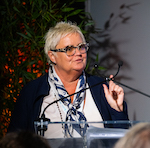
Research and Innovation brings Europe together
The COVID-19 pandemic has shown the importance of the countries working together to share experiences, data and resources. In the area of research, the ERAvsCorona Action plan1 was rapidly agreed between the European Commission and the EU Member States when the pandemic hit Europe in spring 2020. This plan has guided research and innovation actions and investments to speed up the work necessary to deal with the devastating situation the world was facing.
An important aspect for co-operation in response to the COVID-19 pandemic was the rapid set up and mobilisation of pan-European clinical trials networks. These networks facilitate the rapid assessment of treatment strategies in intensive care settings and evaluates the usefulness of repurposed or new therapies against Covid-19 through the RECOVER2 and EU-RESPONSE3 projects.
These networks were rapidly followed by the set-up of the VACCELERATE4 project that coordinates and conduct COVID-19 vaccine clinical trials. The networks brings together clinical trials sites across Europe and they work closely with the European Medicines Agency (EMA) and the European Centre for Disease Prevention and Control (ECDC) to make sure the clinical research are conducted in the most effective and best possible way, and that the most promising or important questions or aspects can be addressed rapidly.
Such networks are, and will be, at the core of the continued work to build up a better preparedness for future pandemics. This is also on the table for the discussion that have been launched in view of setting up a closer cooperation between the EU Member States though a Pandemic Preparedness Research Partnership to be set up under Horizon Europe, the new programme for EU funded research and innovation, and as also set out in the ERAvsCorona action plan.
However, collaboration between the EU Member States is nothing new in the area of research and innovation.
The collaboration between national research funding organisations and the management of co-funded research programmes has been ongoing since 2003. In Horizon 2020 an increased interest of policy makers from both research and health authorities at national and regional has however been recognised.
This can be exemplified by the International Consortium for Personalised Medicine, IC PerMed5, that brings together close to 50 partners and where several EU Member States are represented by both research and health policy makers with Germany, Austria and Italy as examples. Several regional health authorities are also members including the Spanish Basque and Navarra regions, the Italian Lombardy region, as well as South Eastern Norway. They all work together to support a strong science base and to investigate the benefits of personalised medicine approaches to citizens and health care systems.
A closer integration of research and health care is also ongoing with rare diseases as paving the way for this type of co-operation.
To better support the estimated 30 million EU citizens that suffers from a rare disease, the European Joint Programme on Rare Diseases, EJP RD6, has brought 130 institutions from 35 countries (including 26 EU Member States) together.
This co-operation have created an efficient innovation eco-system making sure that research results rapidly can be taken up in clinical practice through one of the European Reference networks (ERNs7) The EJP RD will decrease the fragmentation of expertise and aims to improve the health care systems capacity to take up research results. All to make sure that diagnosis, adequate care and therapies faster are brought faster to those living with a rare disease.
The COVID-19 pandemic has also meant that the European Health systems has been facing exceptional challenges. This on top of the already pressing situation with an ageing population, increased costs, shortages of health professionals, and inequalities in access to health care. It is therefore good that preparations for stepping up health systems research is already underway through a new co-funded partnership foreseen under Horizon Europe.
The aims of this partnership are ambitious – but necessary – as it must bring together the whole value chain of stakeholders, and thereby taking the complexity of Europe’s health and care systems into consideration by working across countries and regions, across health and care delivery and in close collaboration with researchers.
This partnership does not start from scratch has it will build on strong initiatives such as the To-Reach project8 where policy makers, research funders and research organisations from 20 countries has over the last years has worked on a strategic research agenda. It will further build on the experiences of initiatives such as the Active and Assisted Living Programme9, the Joint Programming Initiative “More Years, Better Lives”10 and the European Innovation Partnership on Active and Healthy Aging11.
These are but a few examples of how research and health authorities increasingly work close together across EU Member States and European regions to address key challenges in the area of health and care and where research can provide new innovative solutions for the benefit of the European Citizens.
____________________________________________________________________________________________________
1 ec_rtd_era-vs-corona.pdf (europa.eu)
2 Recover Europe – Recovering from Covid19 (recover-europe.eu)
7 Work of the ERNs | Public Health (europa.eu)
8 TO-REACH – Towards a joint EU research programme on Health Systems
9 AAL Home 2020 – AAL Programme (aal-europe.eu)
11 EUROPEAN INNOVATION PARTNERSHIP | on Active and Healthy Ageing (europa.eu)




